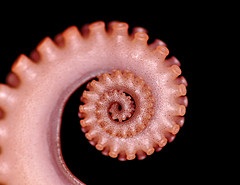The Secret Life of An Octopus: Cognitive Capabilities
Biology 342 Fall : Katrina Gertz & Maria Zapetis
Octopi are capable of cognitive learning
Often underestimated and misunderstood, octopi are wonderfully intelligent creatures that deserve respect from the vertebrate community. By claiming intelligence of their own, "highly evolved" species, such as humans, should recognize the octopus's intellectual superiority among invertebrates. The question is, just how far down in the benthic zone are you willing to go?
Behaviors such as play, problem solving, and personality can signify cognitive ability in animals. Although formerly thought to be unique to humans, cognitive abilities have been demonstrated in a wide variety of vertebrates, including most mammals and even fish (Kuba et al, 2003). More recently, researchers have come to identify complex cognitive abilities in some invertebrates, such as octopi (Mather, 1995).
Octopi are desirable organisms for animal behaviorists to study due to their large brain-to-body size ratio, impressive learning capacity, excellent visual acuity, and variability of intraspecies behavior. Many octopi traits, such as the aforementioned, have been shown to be evolutionarily convergent to higher vertebrates (Hochner et al, 2006).
Cognitive Tidbits: Play, Problem Solving, & Personality
Play: Leave it to cephalopods to have fun while learning! Play behavior in an octopod (O. dofleini) was first  reported by Mather and Anderson in 1999. According to Burghardt (1999) play behaviors are:
reported by Mather and Anderson in 1999. According to Burghardt (1999) play behaviors are:
- incompletely functional in the context in which it is expressed
- spontaneous and pleasurable ("done for its own sake")
- differ from other behavior in being exaggerated or modified
- repeatedly observed in a non stereotypic manner
- observed in healthy subjects and in stress free condition
Personality: It has been demonstrated that individual octopi may react differently from their conspecifics to novel situations (Mather & Anderson, 1993). Such variations in behavior are complex enough to be considered distinct personalities, which have been shown to arise from more basic variations in juvenile behaviors known as temperaments (Sinn et al, 2001).
Problem solving: Types of problem solving observed in octopi include:
- observational learning (Fiorito and Scotto, 1992)
- spatial learning (Boal et al, 2001)
- tool use (Finn et al, 2009)
- predator deception (Norman et al, 2002)
Octopi can conduct basic concept formation in assessment of complex sensory information and choice of motor output (Wells, 1978) - that is, they are integrating perception and gathering information in order to make intricate future decisions.
We, the humble human co-authors of this site, would like to extend a warm welcome our new Cephalopod Overlords.
